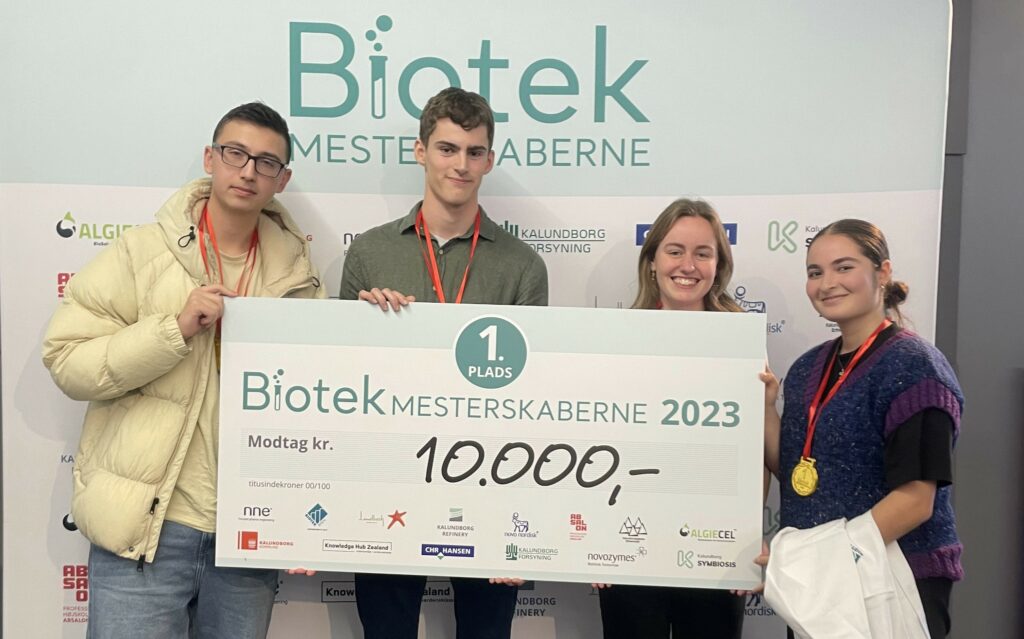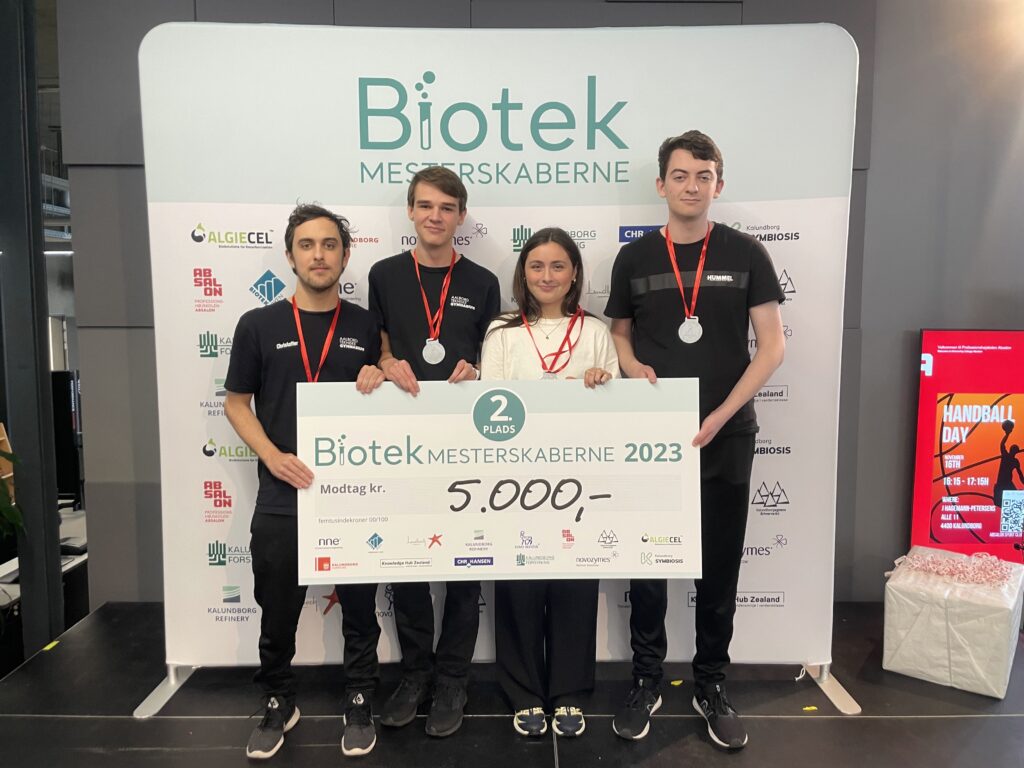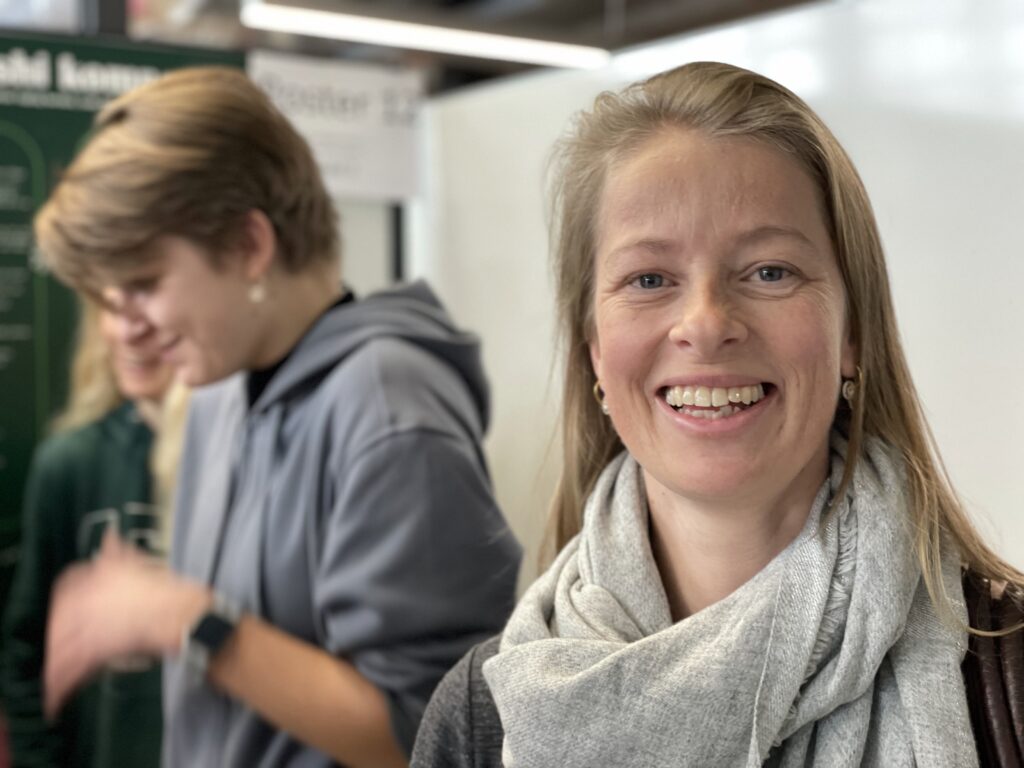
High school classes from all over the country competed in the Biotech Championships in Kalundborg to find solutions to the UN Sustainable Development Goals through biotechnology. The 1st prize winners were Fredericia Gymnasium, who won for their innovative solution to reduce chemicals in the clothing industry.
243 students from 13 high schools from Lyngby to Lemvig have in recent months put on their lab coats to think innovatively and conduct experiments at home in the high school lab. On November 1, they all met in Biotekbyen Kalundborg for poster presentations of their ideas, experiments and conclusions to panels of judges across industry and education.
This year, the participating high schools took part in case studies in fermentation, wastewater treatment and enzyme activity.
Three groups, two from Aalborg Tekniske Gymnasium and one from Fredericia Gymnasium, advanced to the final, where they presented their projects to all participants and a final judging panel consisting of judges from Unibio, Novo Nordisk, Novozymes and Absalon. Fredericia Gymnasium participated with the project 'Bacteria follow the trend of recycling and clothing' and won the 1st prize of DKK 10,000.
We've seen a lot of great and innovative projects today, so it was a tough choice. Fredericia wins first prize for their innovation in both method and application, looking at one of the world's most environmentally damaging industries, the textile industry. The students investigated how bacteria can be used to dye textiles instead of chemical dyes. The fact that they also used used frying oil as a growth medium for the bacteria was something we hadn't seen before, and it's a really exciting idea with great sustainability potential.
Christian Møller Pedersen
Head of Education in the Center for Engineering and Science at University College Absalon and member of the final judging panel
The winning group was also praised for its engaging and well-prepared presentation, which from the start gathered the audience's focus on the huge industry the apparel industry represents.
The winning group explains their project:
The recycling of clothing in particular, and the fact that the textile industry is the 4th largest environmental culprit in the EU alone, are themes that have been of general interest to us. Here we have had an exciting opportunity to investigate how a bacterium that we know from our lessons can be used on a large scale in the world. We have used a bacterium that produces red color, but other bacteria can be used for other colors.
The winning team: Rasmus, Mathilde, Soner and Zeliha from Fredericia Gymnasium
Aalborg Technical High School won both 2nd and 3rd prize (DKK 5,000 and DKK 2,000 respectively) for the projects "Kombucha on green tea" and "3rd generation bioethanol".
Alongside the presentations, the high school students were able to walk around in the best trade fair style and meet the biotech companies from Kalundborg and the surrounding area. This gave them an insight into how their interest in biotechnology can also be used in the long term in their education and career paths.
One of the participating companies was Novozymes, which in addition to participating in judging panels also had a well-attended stand at the event:
The biotech city of Kalundborg is developing rapidly, and both Novozymes and the industry in general are experiencing an increasing need for labor. This is one of the reasons why it is so important that we open young people's eyes to the many exciting educational and career opportunities here in the city. We need even more dedicated talents with a passion for bio- and natural sciences - and by reaching out to "the entire food chain", we are well on our way."
Steen Skærbæk, Senior Director in Enzyme Bulk Production at Novozymes Kalundborg

2nd place went to the team from Aalborg Tekniske Gymmasium
Both students and teachers welcome the Biotech Championships as a different way of learning, where students take the helm and solve a problem of their own choosing:
It was exciting to work with a case where we had to figure out what we wanted, and it was actually a longer process where we had to manage the project ourselves and the teacher was more of a support along the way. It was also cool that it was about global goals, so you can see how what we learn in class can actually move something in the world.
Silje Nyengaard, participant from 2.A at Lemvig Gymnasium
From Alssundgymnasiet in Sønderborg, it is also the meeting with the wide range of companies that is attractive:
"Not only has it been great to see the students' engagement and creativity in the project, but it's also a great opportunity to explore the possibilities in biotechnology for their future career paths. We don't have many companies of this type in our geography, but here the students can really see that there are many different paths to take with the professional interest they have in their biotechnology program. Maybe next time we will combine participation with a company visit to Biotekbyen."
Kirsten Lüders, biotechnology teacher, Alssundgymnasiet

Kirsten Lüders, biotechnology teacher at Alssundgymnasiet in Sønderborg

Knowledge Hub Zealand
Biotekparken 1
4400 Kalundborg



Knowledge Hub Zealand
Biotekparken 1
4400 Kalundborg